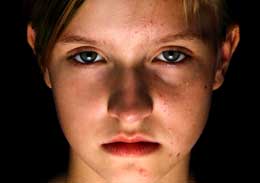18 April 2013
 Teenagers and young adults across the country could benefit from a new University of South Australia study, which is investigating essential oils and aromatherapy as an effective and inexpensive way to treat acne.
Teenagers and young adults across the country could benefit from a new University of South Australia study, which is investigating essential oils and aromatherapy as an effective and inexpensive way to treat acne.
In addition to evaluating the physical effectiveness of essentials oils as an alternative treatment for acne, the study will examine the psychological impact of the condition and draw cost comparisons with conventional treatments.
Lead researcher on the study, Tamara Agnew, says that while current treatments are considered clinically effective, acne is still widespread in the community. While it is most common in teenagers, adults are also affected.
“The majority of teenagers will experience the physical symptoms of acne at some point during adolescence. In Australia, more than 80% of all teenagers have acne,” Ms Agnew says.
“Current acne treatments include over-the-counter remedies and prescribed topical and oral medication. As acne is a multi-factorial disease, a combination of treatments is often recommended. But these multiple drug regimens are complex, can have side-effects, and poor adherence to treatment is common.”
While the physical symptoms of acne typically last ‘on and off’ for between two and five years, Ms Agnew says the psychological effects from the disease can continue well into adulthood. An important component of the study will be evaluating whether any observed reduction in physical presentation through treatment with essential oils leads to a better quality of life for sufferers.
“Acne can have lasting psychosocial effects, which are not often addressed,” Ms Agnew says.
“These symptoms can include anxiety, depression, impairment of emotional functioning, and low self-esteem and body image issues.”
The study will enlist aromatherapy clinicians to treat two groups with essential oils, supplied by Sydney Essential Oil Company. A third group will continue their regular treatment routine and receive the essential oils product at the end of the trial period.
“This will be the first known randomised controlled trial to examine the effectiveness of aromatherapy as it is practiced by clinicians,” Ms Agnew says.
“Essential oils have the potential to act via dermal absorption and their therapeutic properties make them potentially effective in treating bacterial infection, inflammation, pain and nausea.
“In vitro studies have found essential oils to be effective against the bacteria involved in acne Propionibacterium acnes - but there is a lack of clinical evidence to support the claims that essential oils will help reduce physical symptoms of acne, which is why this study is so important.
“We will also be evaluating the cost-effectiveness of aromatherapy, as there is currently a lack of literature to see if there are any benefits in this area.”
The Adelaide based study is calling for people with facial acne aged between 16-45 years to participate in the clinical trial. For more information, go to www.becleansed.com.au.
Tamara Agnew is a PhD candidate at UniSA’s Division of Health Sciences and is being supervised by Professor Leonie Segal and Dr Matthew Leach.
Contact for interview
Tamara Agnew mobile 0451 961 780 email tamara.agnew@mymail.unisa.edu.au
Media Contact
Rosanna Galvin office (08) 8302 0578 mobile 0434 603 457 email rosanna.galvin@unisa.edu.au




